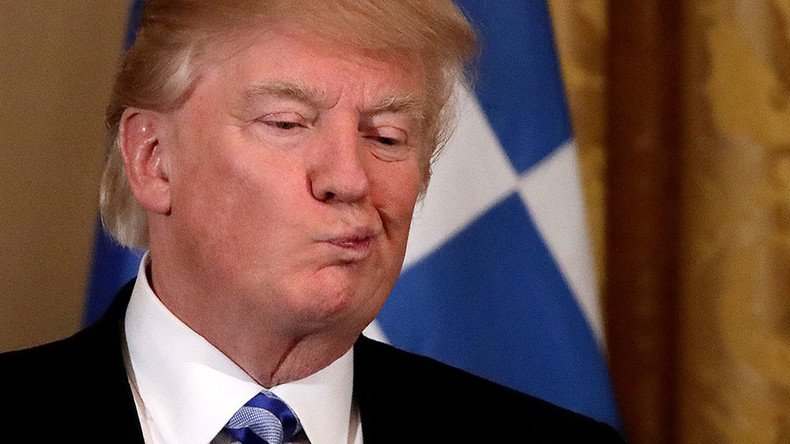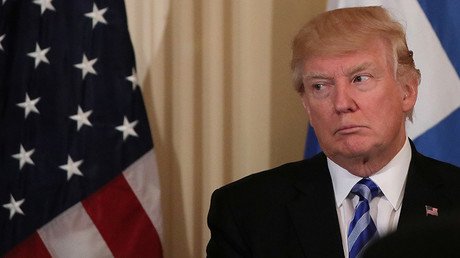Donald Trump loses his first game in the big leagues on Capitol Hill

Trump’s reputation as a deal maker lays in tatters as he fails to understand the competing forces in Washington DC.
US President Donald Trump has known only victory over his foes – until now. In the past, business opponents, reality network TV rivals, and even the Hilary Clinton political machine were felled without mercy. But last week he came up against an opponent even more unpredictable than he. He was vanquished by a venerable and implacable adversary – the United States Congress.
This wasn’t as simple as a head to head election against a damaged opponent like Hillary, or even a game that would provide a fairy-tale comeback like that secured by his friend Tom Brady in the Super Bowl last month.
What an amazing comeback and win by the Patriots. Tom Brady, Bob Kraft and Coach B are total winners. Wow!
— Donald J. Trump (@realDonaldTrump) February 6, 2017
This was the real deal, on Capitol Hill.
Surveying the wreckage of Trump’s proposed American Health Care Act, it is easy to imagine that when the country’s forefathers constructed the US Constitution, with its checks and balances, it may have been with an erratic and unpredictable president like this in mind. It was bad legislation.
There is more to this defeat, however, as it illustrates that Trump, a political ingénue, does not understand Congress and politics. It was his Republican Party who pursued the repeal of the 2010 Affordable Care Act – known as Obamacare – for most of the previous president’s reign.
This what the Republicans wanted, they told Donald so, and they would vote for his plan to get rid of it. Simple? No, not on Capitol Hill.
You can hardly blame Trump for being utterly shocked that the same party rejected the opportunity to throw it out when finally presented with the chance.
As Trump licks his wounds at his Mar-a-Lago estate this weekend, he will understand that this politics game is not as straightforward as he thought.
A fundamental plank of Trump’s successful presidential campaign was that he would tear up the Affordable Care Act – predecessor Barack Obama’s hard-won attempt to bring fairness to the American healthcare system. He had proposed the American Health Care Act (AHCA) instead. On Friday, House of Representatives Speaker Paul Ryan visited Trump at the White House to tell him they did not have the votes to pass the controversial measure. A defeated and humiliated Trump was forced to withdraw the bill without putting it to a vote.
Ryan was unable to round up the 216 votes needed for passage.
Trump probably revealed more about his ignorance than he intended when he told reporters at the White House on Friday: “We learned a lot about loyalty. We learned a lot about the vote-getting process.”
READ MORE: House speaker briefs press after pulling Obamacare repeal bill
Yes, this defeat has ramifications for the future of healthcare in the US. Of greater consequence was that politically, this was Trump’s first match in the big leagues. And he was annihilated. If he has any emotional intelligence, he will see that the path of his presidency has been marked out on a map for him, by Congress. He will have to take that old democratic institution’s path or bunker down in the White House for the next four years, achieve nothing, and retire after one term. Trump wanted to bring in sweeping tax reforms and begin an enormous infrastructure building scheme, rebuild the military and, of course, “build the wall” between the United States and Mexico.
And the world will now trawl over his promises on these subjects. He criticized Obamacare 435 times on Twitter in the past.
The GOP doesn't waste an opportunity to waste an opportunity. Defunding Obamacare should be central to any deal.
— Donald J. Trump (@realDonaldTrump) July 18, 2011
President Obama, Gruber and all of the other Obama cronies got ObamaCare passed by lies and fraudulent statements. Courts should overturn!
— Donald J. Trump (@realDonaldTrump) December 10, 2014
These all seemed like costly and ambitious, even foolishly overambitious, projects. The repeal of Obamacare looked eminently achievable. It was vehemently opposed on ideological grounds by Trump’s Republican Party, which now has a majority in both houses of Congress. Republicans had amended the plan 60 times as it slowly moved through the legislative process, and Obama frequently had to use his veto.
Many Americans opposed Obamacare before it was introduced, as it smelt of socialism. It seemed almost un-American – before they got used to it.
The US medical system is notoriously unequal, only the rich could count on good healthcare until recently. In comparison to the British National Health Service (NHS) or, to the US’ great embarrassment, the healthcare system of neighboring communist state Cuba, America’s health system was a disgrace.
Obamacare sought to extend health insurance coverage to most of the 15 percent of the US population who don’t have it. This group is principally made up of people who receive no coverage from their employers and are not covered by health programs for the poor and elderly.
Many among this lower middle class group turned away from traditional politicians in 2016 and voted for Trump. They voted Republican.
The Republicans’ ACHA sought to wipe out Obamacare. But what they proposed to replace it was rushed and ill-conceived. Any veteran parliamentarian will tell you that rushed legislation is bad legislation. Critics of the ACHA said it sought to fundamentally weaken and cut Medicaid, a federally-funded healthcare assistance scheme for the less well-off. It would also have ended Obamacare requirements to purchase healthcare and allowed untrammelled insurance company fees.
Donald Trump, Paul Ryan, and the Republicans got it wrong. The underprivileged, beaten down section of Trump’s supporters liked Obamacare and the safety net it offered.
‘Obamacare will explode’ warns Trump after Republicans pull healthcare bill https://t.co/K0eRElb2t2pic.twitter.com/Hh7w7Wp3A5
— RT America (@RT_America) March 25, 2017
And the Republican leadership arrogantly failed to get the votes in line.
In the nine weeks since Donald Trump took office, he has taken 12 golf breaks. In that time, he may have improved his golf handicap, but he has achieved little else.
Part of Trump’s appeal was that he had never held any political or public administration position before. He would ‘drain the swamp’ and political cronyism would end. With Christlike fervor, he would eject the political fixers and insiders from Capitol Hill.
That’s all good in the white heat of a presidential campaign. But business is still done in Congress, much the same way it was done 100 years ago, before Donald Trump’s favorite medium Twitter or TV held sway.
Few have mastered Congress. There was one figure, similarly hated by the Liberal intelligentsia, who did. Big, tough-talking Texan Lyndon Johnson did it. He had unequalled success in getting legislation through as president, until the Vietnam War engulfed him. This was because Johnson had spent 30 years ‘on the Hill’ before he became president.
He had forged cross-party relationships and had been involved in countless backroom deals. What strikes you as you read the monumental work on his career, the Years of Lyndon Johnson, by author Robert A. Caro, is the sheer enormity of what he achieved.
In Congress, he created extraordinary coalitions between southern racial supremacists and northern liberals. He’d build a dam for a western Republican congressman and secure a military installation for a southern Democrat. And somehow he’d get them to back each other’s projects when it came time to vote. Then they’d back his pet legislation. The alliances were built up over decades.
Successful presidents since, like Ronald Reagan and Bill Clinton, had long backgrounds as legislators (both had been state governors).
Capitol Hill is about deals. A vote is a valuable commodity, and if it is to be bought, there must be something big in return. Trump was supposed to be a deal maker. But buying a piece of real estate is not like negotiating legislation. Bludgeoning your way through the House of Representatives with ill-conceived legislation, like Trump did last week, won’t work.
The alliances worked in the opposite way for Trump last week.
Republicans from less well-off districts had been subjected to lobbying from ordinary voters who have grown to value the protection Obamacare has given them. The vocal voters also opposed changes because of possible increases in their premiums.
Many moderate Republican returned to Capitol Hill convinced they might lose their seats in the 2018 mid-term elections. The people were speaking.
Then, members of the Freedom Caucus, the House's most conservative members, came out against Trump’s proposals – for totally different reasons. They considered parts too similar to Obamacare. They saw it as retaining the ‘nanny state’ provisions they had fought to oppose.
Democrats are smiling in D.C. that the Freedom Caucus, with the help of Club For Growth and Heritage, have saved Planned Parenthood & Ocare!
— Donald J. Trump (@realDonaldTrump) March 26, 2017
So a deadly coalition of moderate Republicans and conservative Republicans, for utterly opposing reasons, were going to stop his legislation.
Now tax reform is Trump’s next goal. But it is an even more complex and nuanced subject in the United States.
“I would say that we will probably start going very, very strong for the big tax cuts and tax reform. That will be next,” Mr Trump told reporters at the White House.
But the tax cuts were supposed to be paid for by savings from the withdrawn healthcare bill.
Representative Joe Barton of Texas was asked why his fellow Republicans, once so focused on abolishing Obamacare, rejected the chance when it was given.
“Sometimes you're playing fantasy football and sometimes you’re in the real game,” he said.
Welcome to the big leagues, Donald.
The statements, views and opinions expressed in this column are solely those of the author and do not necessarily represent those of RT.















